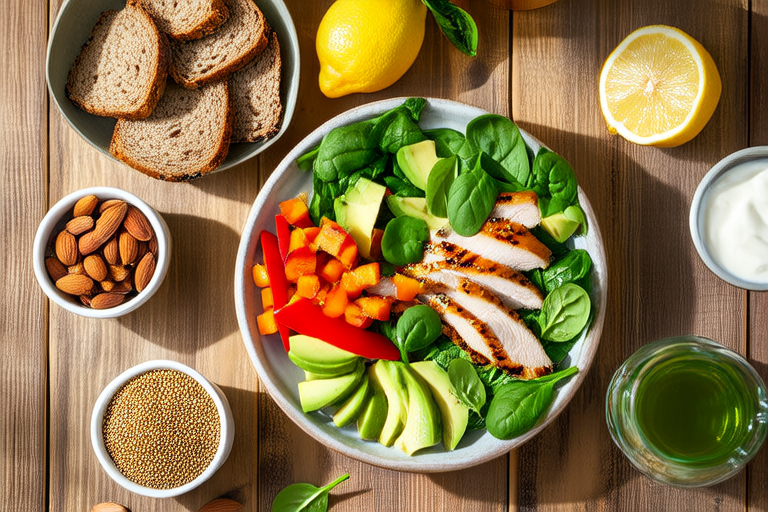10 Essential Guidelines for a Balanced and Healthy Diet
A balanced diet is the cornerstone of good health, providing the essential nutrients your body needs to function optimally. It supports physical well-being, boosts mental clarity, and reduces the risk of chronic diseases such as diabetes, heart disease, and obesity. In today’s fast-paced world, where processed foods and unhealthy eating habits are prevalent, understanding how to maintain a balanced diet is more important than ever. This article outlines 10 practical guidelines to help you adopt healthier eating habits that can be sustained over the long term.
1. Prioritize Whole Foods Over Processed Options
Whole foods, such as fruits, vegetables, whole grains, nuts, seeds, and lean proteins, are minimally processed and retain their natural nutrient content. These foods provide essential vitamins, minerals, fiber, and antioxidants that support overall health. On the other hand, processed foods often contain added sugars, unhealthy fats, and artificial ingredients that can harm your health over time.
Practical Tip: Swap out processed snacks like chips or cookies for healthier alternatives like fresh fruit, raw nuts, or hummus with vegetable sticks. When grocery shopping, focus on the perimeter of the store, where fresh produce and unprocessed items are typically located.
2. Incorporate a Variety of Fruits and Vegetables
Fruits and vegetables are rich in vitamins, minerals, and fiber, making them vital components of a balanced diet. Eating a variety ensures you receive a broad spectrum of nutrients. Different colors indicate different nutrient profiles—green vegetables like spinach are high in iron, while orange ones like carrots are rich in beta-carotene.
Practical Tip: Aim to include at least five servings of fruits and vegetables daily. Add spinach or kale to smoothies, snack on apple slices with almond butter, or roast a mix of colorful vegetables for dinner.
3. Choose Whole Grains Over Refined Grains
Whole grains, such as brown rice, quinoa, oats, and whole wheat bread, are packed with fiber, which aids digestion and helps maintain stable blood sugar levels. Refined grains, like white bread and white rice, have been stripped of their fiber and nutrients during processing.
Practical Tip: Replace refined grains with whole grain options. For example, choose whole wheat pasta instead of regular pasta, or opt for oatmeal instead of sugary cereals for breakfast.
4. Include Lean Proteins in Every Meal
Protein is essential for building and repairing tissues, supporting immune function, and maintaining muscle mass. Lean protein sources, such as chicken, turkey, fish, tofu, beans, and lentils, are lower in saturated fat compared to red meats and processed meats.
Practical Tip: Incorporate a source of lean protein into each meal. For instance, have grilled salmon with your dinner, add chickpeas to salads, or enjoy a tofu stir-fry for lunch.
5. Limit Added Sugars and Artificial Sweeteners
Excessive consumption of added sugars is linked to weight gain, tooth decay, and an increased risk of chronic diseases. Artificial sweeteners, while calorie-free, may still affect appetite regulation and metabolism.
Practical Tip: Reduce your intake of sugary beverages like soda and energy drinks. Instead, drink water, herbal teas, or sparkling water with a splash of lemon. When baking, use natural sweeteners like mashed bananas or dates in moderation.
6. Opt for Healthy Fats
Not all fats are created equal. Healthy fats, such as those found in avocados, nuts, seeds, olive oil, and fatty fish, are crucial for brain health, hormone production, and nutrient absorption. Avoid trans fats and limit saturated fats found in fried foods and baked goods.
Practical Tip: Use olive oil for cooking instead of butter, sprinkle chia seeds or flaxseeds on yogurt, and snack on a handful of almonds or walnuts.
7. Stay Hydrated with Water
Water is essential for nearly every bodily function, from regulating temperature to flushing out toxins. Many people mistake thirst for hunger, leading to unnecessary snacking. Staying hydrated also supports skin health and energy levels.
Practical Tip: Carry a reusable water bottle with you throughout the day to ensure you’re drinking enough. Start your morning with a glass of water and aim for at least eight glasses daily.
8. Practice Portion Control
Even healthy foods can contribute to weight gain if consumed in excess. Portion control helps prevent overeating and ensures you’re consuming the right amount of calories for your activity level and goals.
Practical Tip: Use smaller plates and bowls to manage portion sizes. Pay attention to hunger cues and stop eating when you feel satisfied, not stuffed.
9. Plan and Prepare Meals Ahead of Time
Meal planning and preparation can help you make healthier choices and avoid last-minute unhealthy decisions. Having nutritious meals ready to go reduces reliance on takeout or convenience foods.
Practical Tip: Dedicate one day a week to meal prep. Cook large batches of soups, stews, or casseroles and store them in individual portions for easy access during busy days.
10. Listen to Your Body
Every individual has unique nutritional needs based on factors like age, gender, activity level, and health conditions. Pay attention to how different foods make you feel and adjust accordingly. Intuitive eating encourages mindfulness and fosters a positive relationship with food.
Practical Tip: Keep a food journal to track what you eat and how it affects your energy levels, mood, and digestion. Use this information to identify patterns and make informed dietary choices.
Conclusion
Adopting a balanced and healthy diet doesn’t have to be overwhelming. By following these 10 essential guidelines, you can create sustainable eating habits that promote long-term well-being. Prioritizing whole foods, incorporating a variety of fruits and vegetables, choosing whole grains, and staying hydrated are just a few steps toward better health. Remember, small changes add up over time, and consistency is key. Embrace these principles, and you’ll not only improve your physical health but also enhance your mental clarity and overall quality of life.










